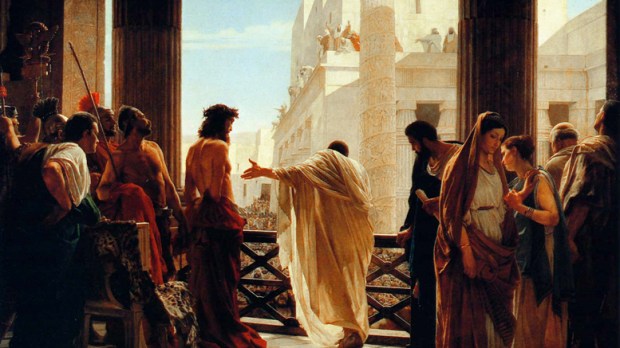On Palm Sunday and Good Friday the lay faithful are permitted to do something that ordinarily is not open to them. On these two days we take a speaking role in the proclamation of the Gospel. We are assigned the task of speaking the words of the crowd present at Christ’s sham trial before Pilate. The words given to us are unpleasant ones. As a congregation we collectively reject Jesus, embrace Barabbas, and call for the crucifixion of our Lord. The disconnect between the words and the feelings of those gathered in the Church often leads to the proclamation sounding flat. The faithful say, but do not feel like they mean, the words prescribed to them. The prevailing sense is one of duty. “I will say these words, but I do not mean them. This is not what I would have said if I had been present. Who would choose Barabbas over Jesus?”
A better question might be “Who among us would choose Jesus of Nazareth over Barabbas?” The idea that the crowd would ask for a murderer and insurrectionist over the Lamb of God elicits shock and surprise for many. In truth, almost every person of faith would choose Barabbas a thousand times before they would so much as consider the Nazarene. Barabbas was a man of action. He stood up to tyrannical oppressors with force. He led a violent insurrection and was imprisoned for it. He fought back.
Jesus did not. He offered His cheek to those who beat Him. He did not protest. He did not even speak out against the violent usurpers who had stolen His country and violated its religious laws. Instead, He criticized the leaders of His own faith; men who faithfully and uncompromisingly observed every aspect of the law. And with whom did he spend His time instead? Dirty people. Sinners. Traitorous tax collectors who collaborated with the Roman occupiers and extorted their countrymen. Undesirables.
Pilate asked Jesus, “Quid est veritas?” This is veritas: We would all choose Barabbas. Two thousand years later, we would choose no better than the crowd. We would cry out for a man of action, a liberator, a rebel, a Barabbas.
Each time I allow my disordered appetites, rather than a desire to do God’s will, to direct my path, I embrace Barabbas.
We would mistake the Lord’s mercy for weakness, His docility for cowardice. We would judge Him as foolish and worthless. We would prepare barbs as unkind as any thorn in the crown the Roman guards made for Him, and we would have no more regard for His life than Caiaphas and the Sanhedrin.
Those who had laid down palms at Christ’s arrival in Jerusalem were the same who cried out for His crucifixion just six days later. What happened to change their opinion so quickly? They had heard stories of a man who controlled nature itself. He commanded weather. He restored sight to the blind. He made the lame walk. Sicknesses and unclean spirits fled the afflicted at the mere sound of His name. They had heard rumors of a man who had lordship over all creation. They had heard stories of a King of Kings, yet this man they had welcomed could not or, worse, would not repel the invaders who worshipped false gods and commanded the faithful to do the same. Would I have had any more patience for this Jesus, or would I dismiss Him as a fraud? Would I, like Herod, demand a demonstration of His power? Would I, like the crucified criminal who blasphemes Jesus, refuse to believe what I had not seen myself?
Barabbas provides us with a foil for Christ. He represents a different vision of the promised Messiah. Jesus was concerned with freeing the people from the spiritual slavery of sin; Barabbas concerned himself with freeing the people from the political slavery of the Romans. Christ engaged in spiritual warfare; Barabbas engaged in physical combat. The Lord’s Kingdom, He tells Pilate, does not belong to this world; the kingdom Barabbas strived to restore was every bit an earthly one.
Every time I choose the earthly over the heavenly, I reject Jesus. Each time I allow my disordered appetites, rather than a desire to do God’s will, to direct my path, I embrace Barabbas. I may say that I would never choose Barabbas over Jesus, but all too often my actions tell a different story.
The people rejected Jesus because the Christ they got was not the Christ they wanted. He is not the Christ that I often find myself hoping and praying for. I, like the crowd, want so desperately to change the state of life on the ground. I want to change laws so that they conform to true justice and protect the most vulnerable. I want to make the world better resemble the Kingdom of God. I want to overthrow those who wield power unjustly. These are not bad desires, but they have the ability to distract us from the most important struggle that we face: the spiritual one within ourselves.


